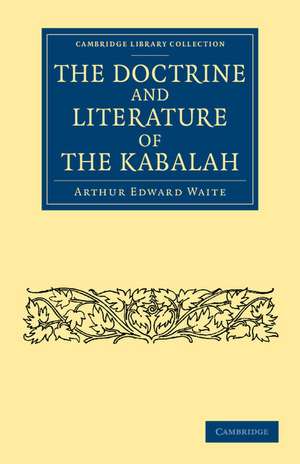The Doctrine and Literature of the Kabalah: Cambridge Library Collection - Spiritualism and Esoteric Knowledge
Autor Arthur Edward Waiteen Limba Engleză Paperback – 25 sep 2013
| Toate formatele și edițiile | Preț | Express |
|---|---|---|
| Paperback (2) | 214.55 lei 6-8 săpt. | |
| Holmes Press – 2 apr 2013 | 214.55 lei 6-8 săpt. | |
| Cambridge University Press – 25 sep 2013 | 517.34 lei 6-8 săpt. |
Din seria Cambridge Library Collection - Spiritualism and Esoteric Knowledge
- 19%
 Preț: 564.21 lei
Preț: 564.21 lei - 19%
 Preț: 725.92 lei
Preț: 725.92 lei - 19%
 Preț: 697.76 lei
Preț: 697.76 lei - 19%
 Preț: 655.76 lei
Preț: 655.76 lei -
 Preț: 369.06 lei
Preț: 369.06 lei -
 Preț: 466.36 lei
Preț: 466.36 lei -
 Preț: 499.57 lei
Preț: 499.57 lei -
 Preț: 371.96 lei
Preț: 371.96 lei -
 Preț: 317.29 lei
Preț: 317.29 lei -
 Preț: 524.29 lei
Preț: 524.29 lei -
 Preț: 420.82 lei
Preț: 420.82 lei -
 Preț: 368.30 lei
Preț: 368.30 lei -
 Preț: 366.57 lei
Preț: 366.57 lei -
 Preț: 371.20 lei
Preț: 371.20 lei -
 Preț: 531.09 lei
Preț: 531.09 lei -
 Preț: 246.93 lei
Preț: 246.93 lei -
 Preț: 421.42 lei
Preț: 421.42 lei -
 Preț: 371.20 lei
Preț: 371.20 lei -
 Preț: 369.83 lei
Preț: 369.83 lei -
 Preț: 248.07 lei
Preț: 248.07 lei -
 Preț: 376.64 lei
Preț: 376.64 lei -
 Preț: 238.00 lei
Preț: 238.00 lei -
 Preț: 421.04 lei
Preț: 421.04 lei -
 Preț: 282.47 lei
Preț: 282.47 lei -
 Preț: 329.98 lei
Preț: 329.98 lei -
 Preț: 242.80 lei
Preț: 242.80 lei -
 Preț: 421.42 lei
Preț: 421.42 lei -
 Preț: 421.42 lei
Preț: 421.42 lei -
 Preț: 373.86 lei
Preț: 373.86 lei -
 Preț: 466.75 lei
Preț: 466.75 lei -
 Preț: 468.86 lei
Preț: 468.86 lei -
 Preț: 369.45 lei
Preț: 369.45 lei -
 Preț: 330.93 lei
Preț: 330.93 lei -
 Preț: 355.43 lei
Preț: 355.43 lei -
 Preț: 466.53 lei
Preț: 466.53 lei - 19%
 Preț: 498.11 lei
Preț: 498.11 lei -
 Preț: 368.10 lei
Preț: 368.10 lei -
 Preț: 248.46 lei
Preț: 248.46 lei -
 Preț: 371.20 lei
Preț: 371.20 lei -
 Preț: 368.48 lei
Preț: 368.48 lei -
 Preț: 374.72 lei
Preț: 374.72 lei -
 Preț: 238.00 lei
Preț: 238.00 lei -
 Preț: 410.28 lei
Preț: 410.28 lei
Preț: 517.34 lei
Nou
Puncte Express: 776
Preț estimativ în valută:
98.99€ • 103.63$ • 81.91£
98.99€ • 103.63$ • 81.91£
Carte tipărită la comandă
Livrare economică 07-21 aprilie
Preluare comenzi: 021 569.72.76
Specificații
ISBN-13: 9781108061995
ISBN-10: 1108061990
Pagini: 536
Ilustrații: 2 b/w illus.
Dimensiuni: 140 x 216 x 30 mm
Greutate: 0.67 kg
Editura: Cambridge University Press
Colecția Cambridge University Press
Seria Cambridge Library Collection - Spiritualism and Esoteric Knowledge
Locul publicării:Cambridge, United Kingdom
ISBN-10: 1108061990
Pagini: 536
Ilustrații: 2 b/w illus.
Dimensiuni: 140 x 216 x 30 mm
Greutate: 0.67 kg
Editura: Cambridge University Press
Colecția Cambridge University Press
Seria Cambridge Library Collection - Spiritualism and Esoteric Knowledge
Locul publicării:Cambridge, United Kingdom
Cuprins
Preface; Book I. Post-Christian Literature of the Jews: 1. Introductory; 2. The occult standpoint; 3. The kabalah and the Talmud; 4. Divisions of the kabalah; Part II. The Doctrinal Content of the Kabalah: 1. The doctrine of the unmanifest god; 2. The doctrine of the ten emanations; 3. The doctrine of the four worlds; 4. The doctrine of the countenances; 5. The instruments of creation; 6. The paths of wisdom; 7. The doctrine of pneumatology; Part III. Source and Authority of the Kabalah: 1. Date and doctrine of the book of formations; 2. Modern criticism of the book of splendour; 3. The date and authorship of the book of splendour; 4. The age of Zoharic tradition; 5. Alleged sources of kabalistic doctrine; 6. Islamic connections of the kabalah; 7. Influence of the kabalah on Jewry; Part IV. The Written Word of Kabalism: First Period: 1. Early kabalistic literature; 2. The book of formation; 3. Connections and dependencies of the book of formation; Part V. The Written Word of Kabalism: Second Period: 1. The book of splendour; 2. The book of concealment; 3. The greater holy synod; 4. The lesser holy synod; 5. The discourse of the aged man; 6. The illustrious book; 7. The faithful shepherd; 8. The hidden things of the law; 9. The secret commentary; 10. The lesser sections of the book of splendour; 11. The ancient and later supplements; Part VI. The Written Word of Kabalism: Third Period: 1. Expositors of the book of splendour; 2. The book of purifying fire; 3. The mysteries of love; 4. Minor literature of kabalism; Book VII: Some Christian Students of the Kabalah: 1. Introductory; 2. Raymond Lully; 3. Picus de Mirandola; 4. Cornelius Agrippa; 5. Paracelsus; 6. John Reuchlin; 7. William Postel; 8. The Rosicrucians; 9. Robert Fludd; 10. Henry More; 11. Thomas Vaughan; 12. Knor von Rosenroth; 13. Ralph Cudworth; 14. Thomas Burnet; 15. Saint-Martin; 16. Eliphas Lévi; 17. Two academic critics; 18. The modern school of French kabalism; 19. The kabalah and esoteric Christianity; 20. The kabalah and modern theosophy; Book VIII. The Kabalah and Other Channels of Esoteric tradition: 1. The kabalah and magic; 2. The kabalah and alchemy; 3. The kabalah and astrology; 4. The kabalah and Freemasonry; 5. The kabalah and the tarot; 6. The kabalah and mysticism; Index.
Notă biografică
Descriere
First published in 1902, this book chronicles the history of Kabbalah and demonstrates its significant influence on nineteenth-century occultism.
